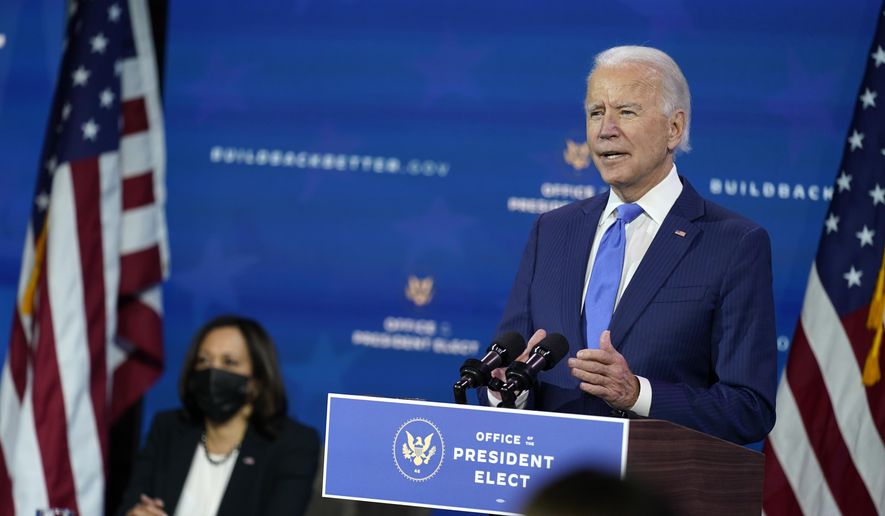European allies are preparing to pounce on presumptive President-elect Joseph R. Biden’s arrival at the White House next month as an opportunity to breathe life back into the all-but-dead Obama-era nuclear deal with Iran.
The 2015 accord, which saw Iran cut its nuclear program in exchange for relief on international economic sanctions, has been on life support since President Trump pulled the U.S. out of the deal two years ago. But Western European signatories, including Britain, Germany and France, continue to hold out hope for the accord’s revival when Mr. Trump steps down.
Several former high-level European diplomats underscored that hope Monday by issuing a detailed blueprint on how Mr. Biden and the U.S. can come back to the deal in the coming months.
“Having worked so hard to preserve the Iran nuclear deal over the last four years, European governments and the EU must now unequivocally call on the incoming Biden administration and Iran to swiftly come back into full compliance,” said the former diplomats in a paper released by the European Council on Foreign Relations, arguing that the “Trump administration’s maximum pressure campaign against Iran has failed.”
The other parties to the 2015 deal — France, Germany, Britain, Russia, China and the European Union — never renounced the accord even as the U.S. reimposed sanctions not only on Tehran but on countries that continued to trade with it. The nuclear deal was a signature foreign policy achievement of the Obama administration and Mr. Biden, Mr. Obama’s vice president, has already signaled his desire for a return to the path of diplomacy with Iran.
But tensions have escalated with Iran over the past two years, making it difficult for Washington and Tehran to fully return to the old status quo. The European statement this week came against a backdrop of outrage in Tehran over the assassination of a top Iranian nuclear scientist, Mohsen Fakhrizadeh, which Iranian leaders have blamed on Israel.
It has been widely speculated that Israeli Prime Minister Benjamin Netanyahu approved the killing in large part to prevent the next U.S. administration from seeking a rapprochement with Tehran.
There were signs Tuesday that Iran was ready to exploit Mr. Fakhrizadeh’s death to gain leverage in the struggle over the future of the nuclear deal.
Tehran has responded to Mr. Trump’s pullout from the deal by methodically exceeding the accord’s limits on uranium enrichment that could be used for a bomb, while pressuring the Europeans in particular to continue economic ties despite the U.S. pressure campaign.
Furious Iranian lawmakers on Tuesday advanced a bill that would suspend U.N. inspections of its nuclear facilities and accelerate uranium enrichment operations if the Europeans do not provide relief from the U.S.-driven oil and banking sanctions.
The official IRNA news agency said 251 lawmakers in the 290-seat chamber voted in favor of the measure, with many chanting “Death to America!” and “Death to Israel!”
Some U.S. analysts predict that Iranian hardliners, who never fully backed President Hassan Rouhani’s outreach to the West to end Iran’s isolation, will reject any attempt by Europe or the incoming Biden administration to resuscitate the nuclear deal.
The European diplomats’ statement downplayed such concerns, citing “positive signaling” by the Rouhani government about reviving the deal, and that Mr. Biden can “take advantage” of it by preparing to act quickly before Mr. Rouhani’s term in office ends in mid-2021.
The statement, signed by such figures as former Swedish Prime Minister Carl Bildt, former German Ambassador to the U.S. Wolfgang Ischinger and former French Ambassador to the U.S. Jean-David Levitte, said the Europeans could begin now acting as intermediaries between the incoming U.S. administration and Iran.
“European governments,” the former diplomats said, “should also intensify communication with other regional actors, notably Israel, Saudi Arabia and the United Arab Emirates, aimed at both preventing dangerous escalation and laying the groundwork for a wider subsequent process.”
There was no immediate reaction from the Biden transition team to the European statement. A meeting is set for later this month between representatives of the countries still in the nuclear deal.
• Guy Taylor can be reached at gtaylor@washingtontimes.com.




Please read our comment policy before commenting.